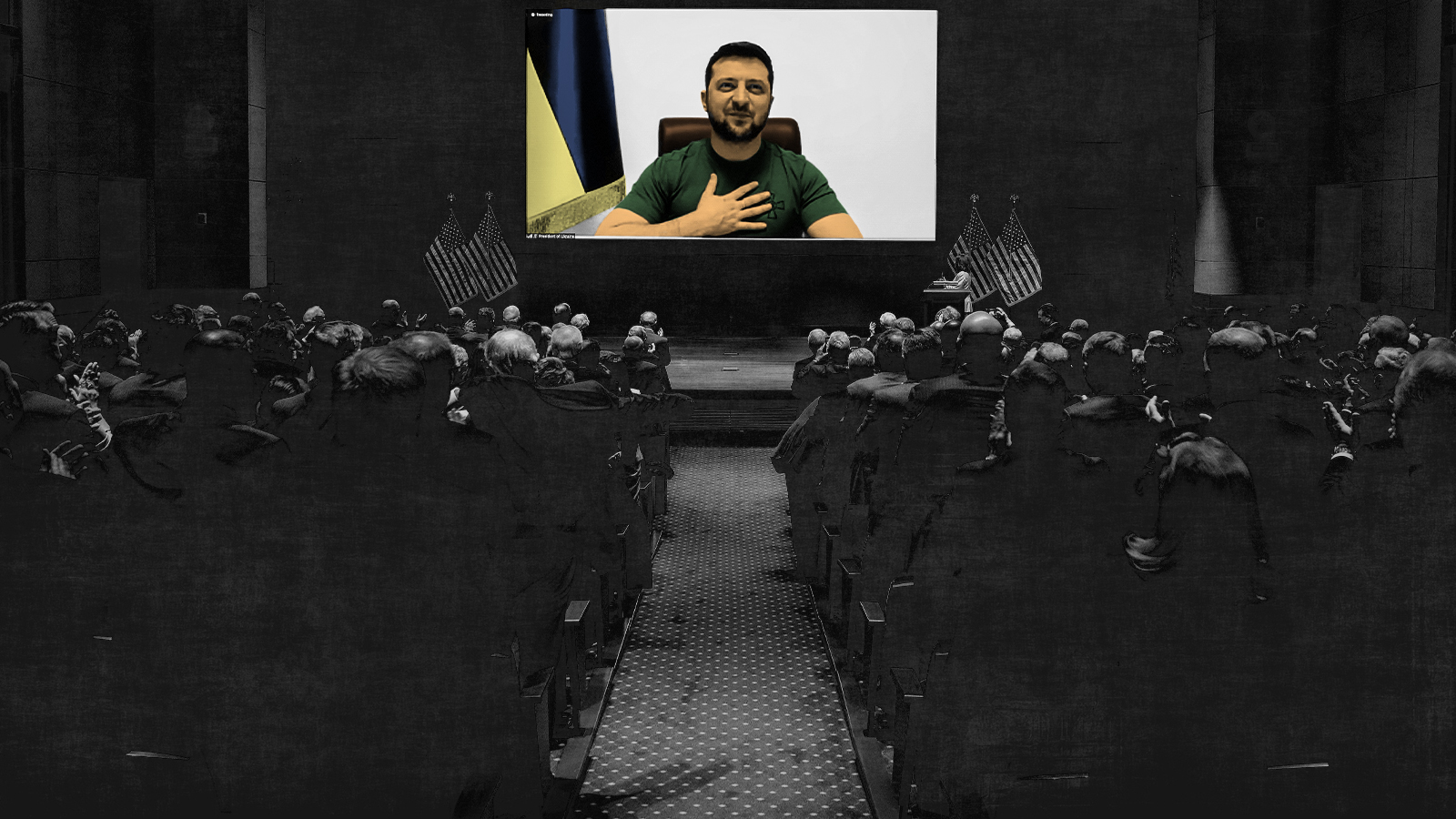Congress wants to play WWII in Ukraine. The trouble is that could start WWIII.


A free daily email with the biggest news stories of the day – and the best features from TheWeek.com
You are now subscribed
Your newsletter sign-up was successful
Ukrainian President Volodymyr Zelensky's appearance before Congress Wednesday morning was a moving event. Using a combination of translated remarks, video montage of Russian attacks, and direct address in English, Zelensky made the case for increased American support of his country's self-defense, including the enforcement of a no-fly zone.
The spectacle seemed to work on its immediate audience. Members of Congress were unusually attentive, applauded in unison, and even choked back tears during the montage. With his background in entertainment, though, Zelensky no doubt understands he wasn't only talking to people in the Capitol Visitor Center. The words and images, including Zelensky's appearance in a worn military T-shirt rather than the statesman's suit and tie, were intended to be disseminated around the world via social media, bolstering Ukraine's propaganda advantage.
A skillful communications strategy is not a reason to reject Zelensky's appeal. Yet the Ukrainian government has good reasons to think Congress might be especially receptive. Many members of Congress have conflicted relationships with the institution in which they serve. Fundraising, constituent service, and haggling over legislative details are exhausting and mostly thankless tasks. Taking a symbolic stand on the great issues of the day is much more appealing. Foreign policy can also offer a respite from polarization — even our increasingly partisan lawmakers like to feel they're serving the whole country, and indeed the world, not just their own party.
The Week
Escape your echo chamber. Get the facts behind the news, plus analysis from multiple perspectives.

Sign up for The Week's Free Newsletters
From our morning news briefing to a weekly Good News Newsletter, get the best of The Week delivered directly to your inbox.
From our morning news briefing to a weekly Good News Newsletter, get the best of The Week delivered directly to your inbox.
There's more than symbolism at stake, though. While members of Congress are replaying World War II newsreels in their heads, the administration is thinking about the risk of getting into World War III. In literally cinematic form, Zelensky evoked the spirit of resistance to Nazi aggression. But reality doesn't always turn out like it does in movies, where Americans inevitably overcome their differences, confront evil, and emerge victorious.
If comparisons to World War II are irresistible, we might take inspiration from the period before the Pearl Harbor attack drew the United States into direct combat with the Axis powers. Under Lend-Lease and other policies, America provided financial and military support to Britain without engaging in combat. Despite the best efforts of the British government — including lobbying efforts and media campaigns — the United States avoided war until we were actually attacked. That's a less exciting script than The Longest Day, Top Gun, or Independence Day. But it's the best option we have.
A free daily email with the biggest news stories of the day – and the best features from TheWeek.com
Samuel Goldman is a national correspondent at TheWeek.com. He is also an associate professor of political science at George Washington University, where he is executive director of the John L. Loeb, Jr. Institute for Religious Freedom and director of the Politics & Values Program. He received his Ph.D. from Harvard and was a postdoctoral fellow in Religion, Ethics, & Politics at Princeton University. His books include God's Country: Christian Zionism in America (University of Pennsylvania Press, 2018) and After Nationalism (University of Pennsylvania Press, 2021). In addition to academic research, Goldman's writing has appeared in The New York Times, The Wall Street Journal, and many other publications.
-
 Will increasing tensions with Iran boil over into war?
Will increasing tensions with Iran boil over into war?Today’s Big Question President Donald Trump has recently been threatening the country
-
 Corruption: The spy sheikh and the president
Corruption: The spy sheikh and the presidentFeature Trump is at the center of another scandal
-
 Putin’s shadow war
Putin’s shadow warFeature The Kremlin is waging a campaign of sabotage and subversion against Ukraine’s allies in the West
-
 ‘The forces he united still shape the Democratic Party’
‘The forces he united still shape the Democratic Party’Instant Opinion Opinion, comment and editorials of the day
-
 Big-time money squabbles: the conflict over California’s proposed billionaire tax
Big-time money squabbles: the conflict over California’s proposed billionaire taxTalking Points Californians worth more than $1.1 billion would pay a one-time 5% tax
-
 Did Alex Pretti’s killing open a GOP rift on guns?
Did Alex Pretti’s killing open a GOP rift on guns?Talking Points Second Amendment groups push back on the White House narrative
-
 Washington grapples with ICE’s growing footprint — and future
Washington grapples with ICE’s growing footprint — and futureTALKING POINTS The deadly provocations of federal officers in Minnesota have put ICE back in the national spotlight
-
 Trump’s Greenland ambitions push NATO to the edge
Trump’s Greenland ambitions push NATO to the edgeTalking Points The military alliance is facing its worst-ever crisis
-
 Why is Trump threatening defense firms?
Why is Trump threatening defense firms?Talking Points CEO pay and stock buybacks will be restricted
-
 The billionaires’ wealth tax: a catastrophe for California?
The billionaires’ wealth tax: a catastrophe for California?Talking Point Peter Thiel and Larry Page preparing to change state residency
-
 Trump considers giving Ukraine a security guarantee
Trump considers giving Ukraine a security guaranteeTalking Points Zelenskyy says it is a requirement for peace. Will Putin go along?
